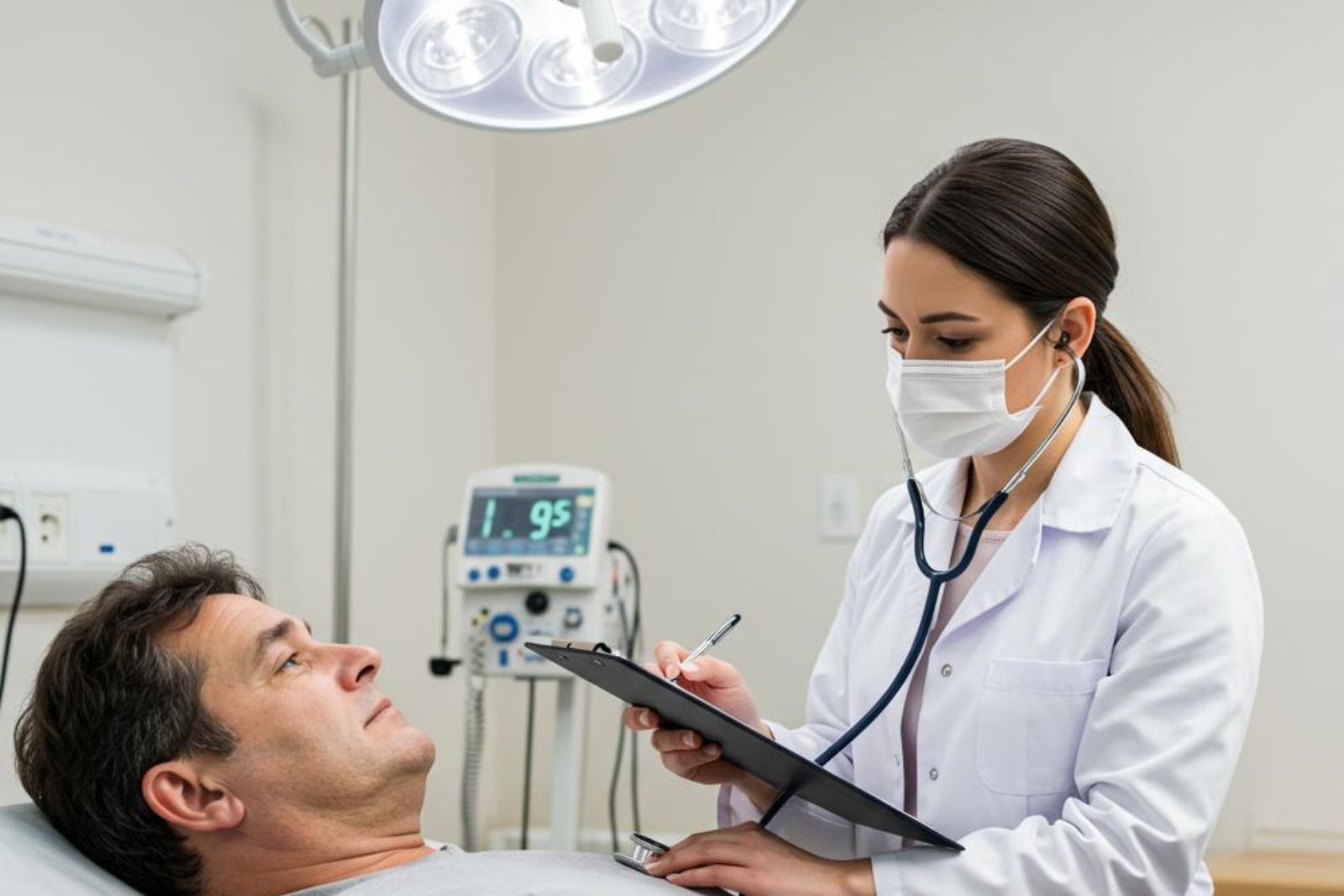
Regular health tests include annual blood work, blood pressure checks every 1-2 years, and age-based cancer screenings. Most adults need basic blood tests yearly to detect diabetes, high cholesterol, and other conditions before symptoms appear.
Why Do Regular Health Tests Matter?
Regular health tests detect diseases before symptoms develop. Many serious conditions like high blood pressure, diabetes, and cancer show no early warning signs. High blood pressure damages your heart and blood vessels silently. High cholesterol blocks arteries without pain. Diabetes develops slowly over years without obvious symptoms.
Early detection through testing prevents complications and saves lives. The American Heart Association reports that regular screening reduces cardiovascular disease deaths by 30-40% annually. Cancer screening programs have decreased cancer mortality rates by 20-25% over the past two decades.
Regular testing helps doctors find problems before they become serious and track changes in your health over time. This proactive approach allows for early intervention when treatments are most effective and less invasive.
What Blood Tests Should Adults Get Annually?
Adults need five essential blood tests every year: complete blood count, blood sugar tests, cholesterol panel, liver function, and kidney function tests. These tests provide a comprehensive overview of your internal health and can detect multiple conditions simultaneously.
Complete Blood Count Analysis
A complete blood count measures all blood cell types in your body. This test counts red blood cells, white blood cells, platelets, hemoglobin, and hematocrit levels. CBC results reveal anemia, infections, and blood disorders that may not cause noticeable symptoms initially.
Normal CBC ranges include red blood cell counts of 4.5-5.5 million cells per microliter for men and 4.0-5.0 million for women. White blood cell counts should range between 4,000-11,000 cells per microliter. Abnormal counts can indicate various health conditions requiring further investigation.
Blood Sugar Monitoring
Blood sugar tests detect diabetes and pre-diabetes through two main methods. Fasting blood glucose checks blood sugar after 8-12 hours without food. Normal fasting levels stay below 100 mg/dL, while levels between 100-125 mg/dL indicate pre-diabetes.
The A1C test shows average blood sugar over 2-3 months. A1C levels below 5.7% indicate normal blood sugar control. Levels between 5.7-6.4% suggest pre-diabetes, while readings of 6.5% or higher indicate diabetes. This test provides a more comprehensive view of blood sugar management than single-point glucose tests.
Cholesterol Panel Evaluation
Cholesterol panels measure good cholesterol (HDL), bad cholesterol (LDL), and triglycerides. These lipid measurements predict cardiovascular disease risk and guide treatment decisions. Total cholesterol levels should remain below 200 mg/dL for optimal health.
HDL cholesterol should exceed 40 mg/dL for men and 50 mg/dL for women. Higher HDL levels provide better cardiovascular protection. LDL cholesterol levels below 100 mg/dL significantly reduce heart disease risk. Triglycerides should stay under 150 mg/dL to minimize metabolic complications.
Adults should begin cholesterol screening at age 20 if they have cardiovascular risk factors. Those without risk factors can start screening at age 35 for men and age 45 for women.
Liver Function Assessment
Liver function tests measure enzymes and proteins that show liver health. These tests include alanine aminotransferase (ALT), aspartate aminotransferase (AST), and alkaline phosphatase levels. High enzyme levels indicate liver damage or disease from various causes including alcohol, medications, or viral infections.
Normal ALT levels range from 7-56 units per liter, while AST levels should stay between 10-40 units per liter. Albumin levels, another liver function marker, should remain between 3.5-5.0 grams per deciliter. Regular monitoring helps detect liver problems before they progress to serious complications.
Kidney Function Testing
Kidney function tests check how well kidneys filter waste from blood. Creatinine and blood urea nitrogen (BUN) levels reveal kidney problems. Normal creatinine levels range from 0.6-1.2 mg/dL for adults, though levels vary based on muscle mass and age.
BUN levels should stay between 6-24 mg/dL in healthy adults. The BUN-to-creatinine ratio provides additional information about kidney function and hydration status. Early detection of kidney problems allows for interventions that can slow disease progression.
Thyroid Function Evaluation
Thyroid tests measure hormones that control metabolism throughout the body. These include thyroid-stimulating hormone (TSH), free T4, and sometimes T3 hormones. TSH levels between 0.4-4.0 mIU/L indicate normal thyroid function in most laboratories.
Abnormal thyroid levels cause weight changes, fatigue, mood problems, and temperature sensitivity. Thyroid disorders affect 12% of Americans during their lifetime, making screening particularly important for early detection and treatment.
How Often Should You Check Blood Pressure?

Adults with normal blood pressure need checks every 3-5 years according to current medical guidelines. People with risk factors need annual checks or more frequent monitoring. Normal blood pressure reads below 120/80 mmHg, while readings of 130/80 mmHg or higher indicate high blood pressure.
Blood pressure categories include normal (less than 120/80), elevated (120-129 systolic with less than 80 diastolic), stage 1 hypertension (130-139/80-89), and stage 2 hypertension (140/90 or higher). High blood pressure increases risk of heart attack and stroke significantly.
Check blood pressure more frequently if you have diabetes, heart disease, kidney problems, or family history of hypertension. African Americans have higher hypertension rates and may need earlier and more frequent screening. Medication management helps control blood pressure when lifestyle changes alone prove insufficient.
What Cancer Screenings Do Adults Need?
Cancer screenings detect cancer before symptoms appear, significantly improving treatment success rates and survival outcomes. Different cancers require different screening methods and schedules based on age, risk factors, and family history.
Breast Cancer Screening Guidelines
Women should get mammograms every 2 years starting at age 40 according to updated US Preventive Services Task Force guidelines from 2024. This represents a change from previous recommendations that suggested starting at age 50.
Women with family history of breast or ovarian cancer may need earlier screening. Those with BRCA1 or BRCA2 genetic mutations typically start screening in their 20s or 30s with both mammography and MRI. Dense breast tissue may require additional imaging beyond standard mammography.
Breast cancer affects 1 in 8 American women during their lifetime. Early detection through mammography reduces breast cancer mortality by 20-40% compared to no screening. Clinical breast exams during routine medical visits complement mammographic screening.
Cervical Cancer Prevention
Cervical cancer screening starts at age 21 with Pap tests every 3 years regardless of sexual activity history. Women ages 30-65 have multiple screening options including Pap tests every 3 years, HPV tests every 5 years, or combined testing every 5 years.
HPV vaccination significantly reduces cervical cancer risk but does not eliminate the need for regular screening. Women who have had hysterectomies with cervix removal may discontinue screening unless they have a history of high-grade precancerous lesions.
Cervical cancer rates have declined 70% since Pap test screening became widespread. Regular screening prevents most cervical cancers by detecting and treating precancerous changes before they progress.
Colorectal Cancer Detection
Adults need colorectal cancer screening starting at age 45 according to current guidelines. The screening age dropped from 50 to 45 in 2021 due to rising cancer rates in younger adults. Screening continues until age 75 for most people.
Multiple screening options exist including annual stool-based tests, flexible sigmoidoscopy every 5 years, or colonoscopy every 10 years. Stool-based tests include fecal immunochemical tests (FIT) and multi-target stool DNA tests. Each method has different advantages and detection capabilities.
Colonoscopy remains the gold standard because it can find and remove precancerous polyps during the same procedure. Polyp removal during colonoscopy prevents 76-90% of colorectal cancers from developing. People with family history may need earlier or more frequent screening.
Lung Cancer Screening Criteria
Adults ages 50-80 with heavy smoking history need annual lung cancer screening with low-dose computed tomography. Screening criteria include 20+ pack-years of smoking history and current smoking or quitting within the past 15 years.
Pack-years calculate cumulative smoking exposure by multiplying packs per day by years smoked. Someone who smoked one pack daily for 20 years or two packs daily for 10 years both have 20 pack-years of exposure.
Lung cancer screening reduces mortality by 20% in high-risk individuals. However, screening also carries risks including false-positive results, radiation exposure, and potential complications from follow-up procedures. Shared decision-making between patients and providers helps determine screening appropriateness.
When Should Adults Get Diabetes Screening?
Diabetes screening starts at age 35 and repeats every 3 years for adults without risk factors. People with obesity, family history, or other risk factors need earlier and more frequent testing. Pre-diabetes affects 88 million American adults, with most unaware of their condition.
Risk factors requiring earlier screening include family history of diabetes, high blood pressure, heart disease, polycystic ovary syndrome, and history of gestational diabetes. Adults with multiple risk factors may need annual screening regardless of age.
Diabetes screening uses fasting blood glucose, random blood glucose, or A1C tests. Each test has different advantages and limitations. A1C testing provides the most comprehensive assessment of blood sugar control over time.
Early detection prevents complications like heart disease, kidney damage, vision loss, and nerve damage. Weight loss programs can help prevent progression from pre-diabetes to diabetes in many cases.
What Mental Health Screenings Do Adults Need?
Mental health conditions affect 1 in 4 adults annually, making regular screening essential for comprehensive healthcare. Depression screening should occur during routine medical visits, especially for adults with chronic medical conditions or significant life stressors.
Depression treatment improves outcomes when started early. Screening tools like the PHQ-9 questionnaire help identify depression symptoms and monitor treatment progress. Anxiety disorders often co-occur with depression and may require separate evaluation.
Substance use screening should occur annually or when risk factors are present. This includes alcohol use, prescription drug misuse, and illegal drug use. Early intervention prevents progression to substance use disorders and associated health complications.
What Infection Tests Do Adults Need?
Adults need screening for several infectious diseases based on age, risk factors, and sexual activity. One-time screening for HIV and hepatitis C is recommended for all adults, while sexually transmitted infection screening depends on individual circumstances.
HIV Testing Recommendations
All adults ages 15-65 need one HIV test in their lifetime according to current CDC guidelines. People with high-risk behaviors including multiple sexual partners, injection drug use, or partners with HIV need annual testing.
HIV testing uses blood or oral fluid samples with results available within minutes to days depending on the test type. Early HIV detection allows for immediate treatment that prevents disease progression and reduces transmission risk.
Pre-exposure prophylaxis (PrEP) is available for high-risk individuals to prevent HIV infection. Regular monitoring is required for people taking PrEP medications.
Hepatitis C Screening Protocol
Adults ages 18-79 need one-time hepatitis C testing regardless of risk factors. Pregnant women receive testing during each pregnancy. Baby boomers (born 1945-1965) have the highest hepatitis C rates and benefit most from screening.
Hepatitis C causes chronic liver disease in 75-85% of infected individuals. New direct-acting antiviral medications cure hepatitis C in 95% of patients with 8-12 weeks of treatment. Early detection prevents liver cirrhosis, liver cancer, and liver failure.
Sexually Transmitted Infection Testing
Sexually active women under 25 need annual chlamydia and gonorrhea testing. Women over 25 with risk factors including new or multiple sexual partners also need regular screening. Men who have sex with men need more frequent screening for multiple STIs.
Syphilis screening is recommended for pregnant women, people with HIV, and those at increased risk. Psychotherapy services may help individuals address behaviors that increase STI risk.
What Specialized Health Screenings Are Available?
Several specialized screenings target specific health conditions or population groups. These include bone density testing, vision and hearing assessments, and cardiovascular risk evaluations beyond basic screenings.
Bone Density Assessment
Women over 65 and men over 70 need bone density testing to screen for osteoporosis. DEXA scans measure bone mineral density at the hip and spine. People with risk factors including family history, low body weight, or long-term steroid use may need earlier screening.
Osteoporosis affects 54 million Americans and causes 2 million fractures annually. Hip fractures result in significant disability and increased mortality risk. Early detection allows for interventions that prevent fractures and preserve bone health.
Vision and Hearing Evaluation
Adults under 40 need eye exams every 5-10 years to detect vision problems and eye diseases. People with diabetes need annual dilated eye exams to check for diabetic retinopathy, which affects 28.5% of diabetic adults.
Glaucoma screening becomes more important after age 40, especially for African Americans and people with family history. Hearing tests may be recommended for adults exposed to loud noises or experiencing hearing difficulties.
Cardiovascular Risk Assessment
Advanced cardiovascular screening may include coronary calcium scoring, carotid ultrasound, or ankle-brachial index testing for high-risk individuals. These tests provide additional information beyond traditional risk factors.
Heart disease remains the leading cause of death in the United States, accounting for 1 in 4 deaths annually. IV infusion therapy may support cardiovascular health in some patients with specific nutritional needs.
How Often Should Adults See Their Doctor?
Healthy adults need annual check-ups with their healthcare provider for preventive care and health maintenance. These visits include physical examinations, health screenings, immunization updates, and preventive counseling.
Adults with chronic conditions require more frequent visits. People with diabetes typically need quarterly visits, while those with stable hypertension may need visits every 6 months. Psychiatric services may require monthly or more frequent appointments during initial treatment phases.
Telehealth visits can supplement in-person care for routine follow-ups and medication management. Telehealth services improve access to care and reduce travel burden for patients with chronic conditions.
What Health Tests Start at Different Ages?
Health screening schedules change based on age and disease risk patterns. Younger adults focus on establishing baseline values and screening for conditions with early onset potential.
Adults ages 18-39 need annual blood work, physical examinations, and blood pressure checks every 3-5 years. Women should begin cervical cancer screening at age 21. Cholesterol screening typically starts between ages 20-35 depending on risk factors.
Adults ages 40-49 should continue previous screenings while adding mammograms for women and considering early colorectal cancer screening. This age group often develops risk factors for chronic diseases requiring more frequent monitoring.
Adults ages 50 and older need comprehensive cancer screening including mammograms, colonoscopy, and lung cancer screening if applicable. Bone density testing and more frequent cardiovascular assessments become important during this life stage.
How Much Do Health Tests Cost?

Most preventive health tests receive coverage at 100% by insurance under the Affordable Care Act. These services include mammograms, colonoscopies, blood pressure checks, cholesterol testing, and immunizations when provided by in-network providers.
Coverage applies specifically to screening tests in asymptomatic individuals. Diagnostic tests performed due to symptoms or abnormal screening results may require copayments or deductibles. Understanding insurance benefits helps patients access appropriate preventive care.
Community health centers provide sliding-scale fees for uninsured individuals. Many pharmacies offer basic health screenings at reduced costs. Free screening programs are available for certain conditions like breast and cervical cancer.
How Should You Prepare for Health Tests?
Blood test preparation varies depending on specific tests ordered. Fasting requirements range from 8-12 hours for glucose and lipid panels. Water intake is typically allowed during fasting periods unless specifically restricted.
Medication timing may affect certain test results. Patients should discuss medication schedules with their healthcare providers before testing. Some medications require temporary discontinuation while others should be continued as prescribed.
Accurate medication lists including prescription drugs, over-the-counter medications, and dietary supplements help providers interpret test results correctly. Previous test results provide valuable comparison data for tracking health changes over time.
Frequently Asked Questions
What Is the Most Important Health Test for Adults?
Blood pressure measurement is the most important single health test for adults. High blood pressure affects 45% of American adults and significantly increases cardiovascular disease risk. Regular monitoring allows for early intervention before complications develop.
How Long Do Blood Test Results Take?
Basic blood test results typically return within 24-48 hours for routine panels. Specialized tests may require 3-7 days depending on laboratory processing requirements. Urgent results can often be available within hours when medically necessary.
Can I Eat Before Blood Tests?
Fasting requirements depend on specific tests ordered. Glucose and cholesterol panels require 8-12 hours of fasting, while complete blood counts and basic metabolic panels generally do not require fasting: • Fasting tests: glucose, cholesterol, triglycerides • Non-fasting tests: CBC, thyroid function, kidney function
Should I Stop Medications Before Health Tests?
Most medications should be continued as prescribed before routine health testing. However, certain medications may affect specific test results and require temporary adjustment. Always consult your healthcare provider before stopping any prescribed medications.
What Happens If My Test Results Are Abnormal?
Abnormal test results require follow-up evaluation but do not always indicate serious disease. Single abnormal values may result from temporary factors like recent illness, medication effects, or laboratory variation. Your provider will consider your overall health status and symptoms when interpreting results.
How Often Should I Get a Physical Exam?
Annual physical examinations are recommended for most adults regardless of health status. These visits include preventive screenings, immunization updates, and health counseling. Adults with chronic conditions may need more frequent visits every 3-6 months.
Final Thoughts
Regular health testing forms the foundation of preventive medicine and long-term health maintenance. Early detection of diseases like diabetes, high blood pressure, and cancer dramatically improves treatment outcomes and quality of life. Working with a trusted healthcare provider helps create a personalized screening schedule based on your age, health status, and family history.
Most serious health conditions develop gradually without obvious symptoms. Regular screenings catch problems early when interventions are most effective and less invasive. Staying current with recommended tests protects your health and provides peace of mind about your medical status.
Contact South Florida Med Group to schedule your comprehensive health evaluation. Our experienced team provides personalized preventive care services designed to keep you healthy and detect potential problems before they become serious.

.png)
.png)
.png)



.png)
.png)
.png)



.png)

.png)
